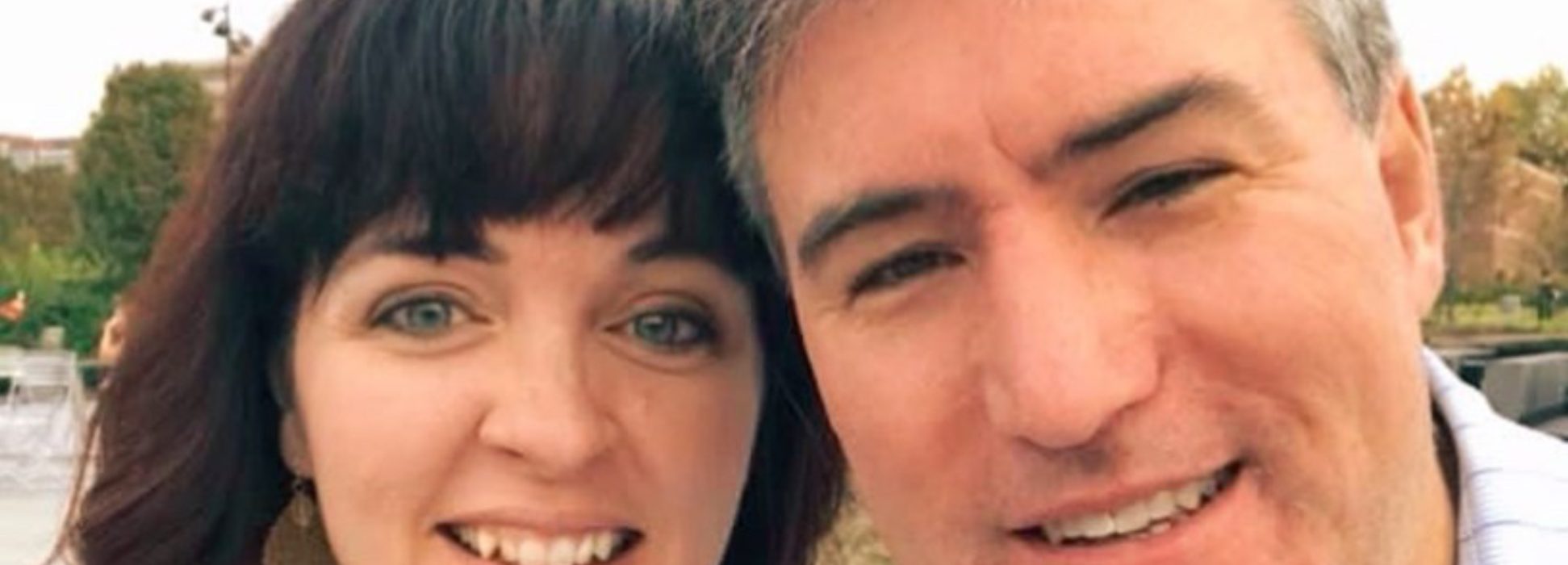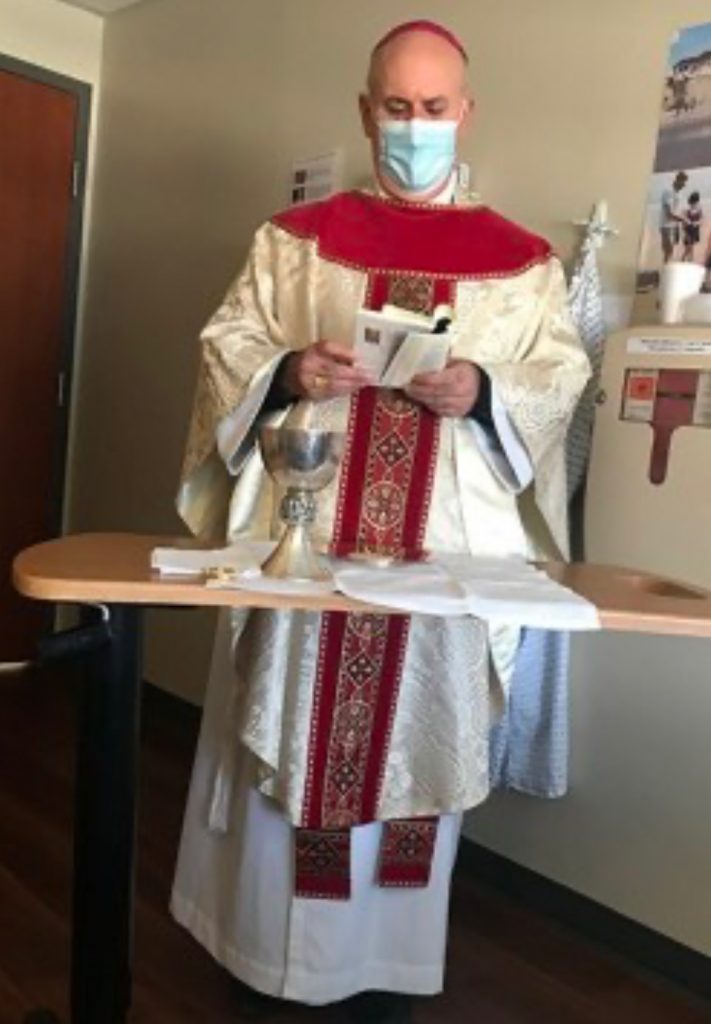March 9, 2021 // Diocese
Nothing short of miraculous: A COVID recovery story
When Jason Shanks entered his Fort Wayne home in mid-February, it was the first time he’d been there since an ambulance had taken him away three months earlier.
In early November, when cases of COVID-19 were rising nationwide, one of Jason’s five kids was exposed to the virus at school, and the family, including Jason’s wife, Melissa, had been quarantining at home. Their 10-year-old son was the first to get symptoms, followed by the rest of the family. No one escaped illness, but it was Jason, who has asthma, who couldn’t shake it. During the second week of illness, as everyone else was starting to feel better, Jason was feeling worse. After doing breathing treatments every three hours, he eventually took himself to the ER, where doctors opted not to admit him.
“He had a cough he just couldn’t get under control, and he didn’t feel like he could breathe very deeply,” Jason’s wife, Melissa, said in an interview with Our Sunday Visitor in early February. At home there was more medicine, more breathing treatments, and other remedies. Nine days after Jason had tested positive — after he had to stop twice to catch his breath while walking down a flight of stairs — they called 911.
“In retrospect, Jason did not realize how sick he was,” Melissa said. “He was thinking he would go, get a little oxygen, steroid shots and come home the next day.”
That didn’t happen. When Jason was admitted into the hospital on Nov. 14, it didn’t take long for the doctors to determine that drastic steps needed to be taken. From the hospital, Jason called his wife and told her they were admitting him to the ICU, and that they were going to intubate and sedate him.
“That’s probably the first time I really thought, ‘Oh my gosh, this is really critical,’” Melissa said.
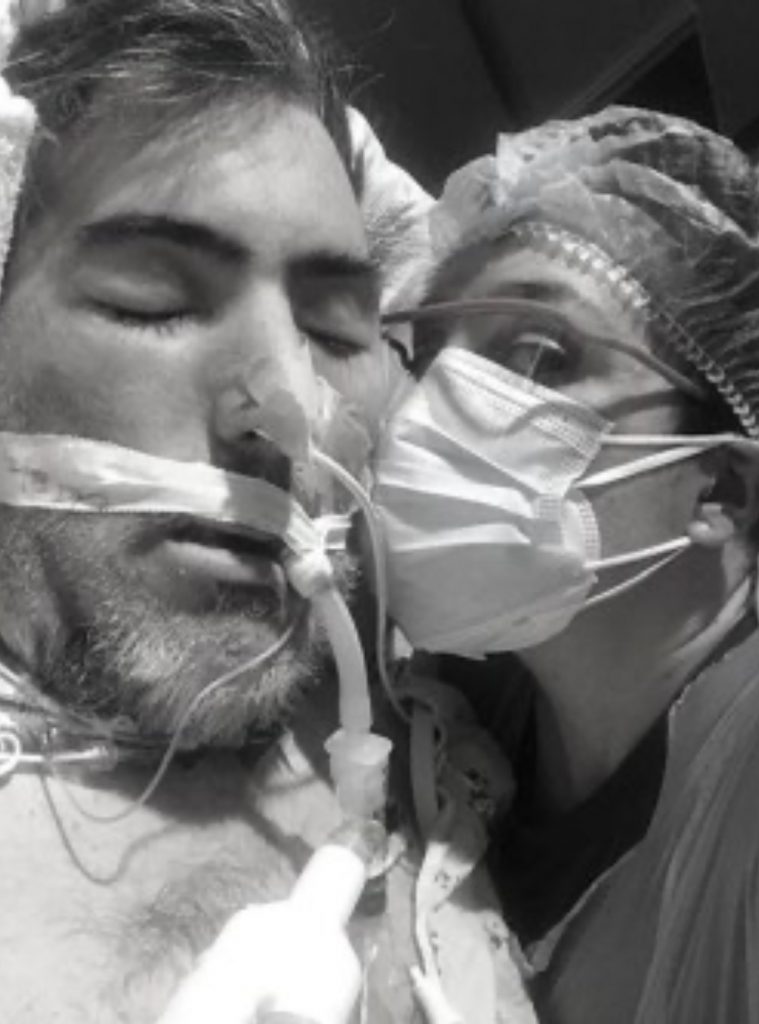
All photos OSV/courtesy
Shanks in the hospital, where he spent six weeks. Upon release he began an extended period of rehabilitation due the extent of the damage the virus had wrought.
That night, Father Tony Steinacker, pastor of SS. Peter and Paul Church in Huntington, who has known Jason and Melissa for nearly two decades, went to the hospital to administer the sacrament of the anointing of the sick to Jason. Before entering Jason’s room, the nurse pulled Father Steinacker aside to explain just how dire the situation was. The next time the priest would be called, she said, it would be because Jason was about to die.
“How humble, how privileged, how unique the role that the priest plays,” Father Steinacker said, calling it a “beautiful privilege to pray the prayers of the Church for this man who had such a deep faith.”
Doctors estimated that Jason would be sedated and intubated for two to three weeks. The goal was to allow Jason’s body to rest so it could fight off COVID, which was still raging inside of him. At that point, Melissa had to make a choice: Was she going to face this trial on her own, or was she going to reach out for support?
“I kind of had to surrender a lot of wanting to handle this on my own, without asking for help,” she said. So she took to social media, asking for urgent prayers. Around her, the community rallied.
Nothing short of miraculous
Organizations such as OSV, where Jason is employed as president of the OSV Institute for Catholic Innovation, organized weekly rosaries and the delivery of regular meals to the Shanks’ home. Local parishes provided supplies and support. A summer babysitter for the family, who happened to test positive for COVID-19 while away at school, returned to Fort Wayne to quarantine with the family, giving Melissa a much-needed hand around the house. People around the world began praying for Jason’s recovery.
Every night, once the kids were in bed, Melissa would FaceTime Jason — the only contact she was allowed to have with him — to pray the rosary and to read the daily Scripture readings, hoping that even though he couldn’t respond, he might still be able to hear her.
“To me, it was like the one thing that I could do,” she said. “The whole time, prayer was a huge comfort.” Practically, too, it allowed Melissa to speak to her husband, and to let him know that he wasn’t alone.
A spark of hope manifested itself during the first week of December. The doctors, who thought the COVID-19 was clearing, tried to wean Jason off the ventilator. He lasted two days. Instead of improving, Jason ended up getting hospital-acquired bacterial pneumonia and MRSA that caused his blood to go septic.
“When he went under the second time, he was actually sicker and in worse condition than when he first came in the hospital,” Melissa said. “That’s when we really got worried, when things got really critical, like we might not make it.”
Problems were compounding fast. Jason’s body began shutting down and he went on kidney dialysis full-time. They considered putting him on a heart-lung bypass machine, but ultimately didn’t do it. Jason’s battle became a race to try to outlive the virus.
Determined to put Jason in the Lord’s hands, Melissa gave an update on Facebook that tried to walk a careful line. She wanted to “really let people know how critical he is and how much we need their prayer,” she said, but she also didn’t want to say that he was dying. Privately, the doctor was telling her that even if Jason survived, his body had sustained so much damage that he may be on dialysis and a ventilator for the rest of his life.
For a week, Jason continued to battle, and the community continued its vigil. Someone recommended praying the St. Jude Novena, and Melissa leapt at the idea. Starting on Dec. 15, people around the world began praying intensely to the patron saint of lost causes. Melissa herself often led the prayer on Facebook Live. Her intention was very specific. “We need to get over COVID,” she said. “We need a radical change in our course right now.”
On the first day of the novena, a friend dropped off a St. Jude relic at the Shanks’ home, and Melissa brought it to the hospital that night. What happened next was nothing short of miraculous.
On the second day of the novena, Melissa got a call from the nurse. Jason finally had tested negative for COVID-19. And the X-ray taken of his chest — the place where the nurse had placed the St. Jude relic the night before — was the clearest since being admitted to the hospital. As the nine days of the novena continued, Jason’s dialysis went from continuous to intermittent. His blood pressure stabilized, and his sedation was eased. On the final day of the novena, Jason received a tracheotomy — a step toward being weaned from the ventilator and toward breathing on his own.
“It was a completely different phase,” Melissa said. “That novena took us from being sick and in fear of death to the path to recovery. It made a huge difference.”
With the virus gone, Melissa now was able to visit Jason daily, even celebrating New Year’s Eve at his bedside.
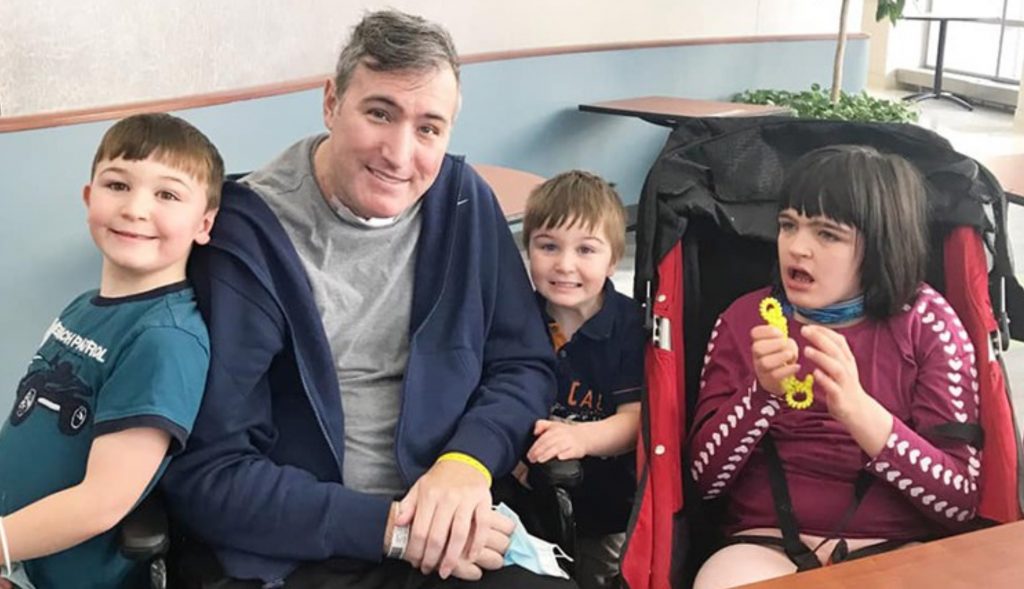
The yearlong ordeal has changed the perspective of the Shanks family as to what’s important and what’s not important, Jason said. What’s important, he has been reminded, is his family.
Long road to recovery
By early January, what had seemed unthinkable only two weeks before was happening: Jason was well enough to leave the hospital where he had been for a month and a half. He was moved to an acute care hospital in Lima, Ohio, where he continued the long road of recovery. Only just beginning to speak, Jason still could not stand, walk, eat or write on his own. In order to be able to fully breathe on his own, he had to strengthen his muscles.
He was also faced with a huge mental hurdle. One of the strangest and most difficult aspects of his illness was that during Jason’s six weeks in sedation, he had created an alternate reality — a dream world that he remembers vividly. When he regained consciousness, he was faced with figuring out what was real and what wasn’t.
“I came to figure out that this was the real world, because in this world, there was the ordinary,” he told Our Sunday Visitor in an interview in mid-February.
“In my dream world, there wasn’t going to the bathroom, there wasn’t cooking dinner. There were just all these scenes.” He relied heavily on Melissa to help him sort reality from fantasy. But despite his challenges, his recovery continued to steadily move forward.
On Jan. 10, the feast of the Baptism of the Lord, Bishop Kevin C. Rhoades of Fort Wayne-South Bend celebrated Mass in Jason’s room at the Ohio facility — Jason’s first Mass since being in the hospital.
“We thanked God for his recovery, and we prayed for all those harmed by the COVID pandemic. Personally, because of the seriousness of Jason’s bout with COVID, I felt much gratitude that he had survived,” Bishop Rhoades told Our Sunday Visitor of the experience. “His rebound and recovery was truly an answer to prayer.”
On Jan. 11, with assistance, Jason stood up for the first time. On Jan. 19, his dialysis port and tracheal tube were removed.
Around the same time, Father Steinacker texted Jason to see if he could visit and bring him the Eucharist. At Jason’s request, the priest read the readings of the day and delivered a short homily. The Gospel passage was the well-known story of how a group of men lowered a paralytic through the roof to lay him at Jesus’ feet. And it resonated in Jason’s heart.
“I really feel like I was the paralytic being lowered down from the roof,” Jason said, recalling that story. “And so for me, the story is really more about those friends that lowered the paralytic down. I think in Scripture we focus so much on the paralytic and Jesus saying, ‘rise and walk,’ but it’s the faith of those friends that frankly saved me. It was the prayer of my wife and friends and colleagues and people from around the world that lowered me through the roof and laid me before Christ. And he said, ‘rise and walk.’ I really think it was the prayers of many that saved my life.”
As time passed, Jason kept beating milestones. By late January, plans were in the works to enable him to return home.
“We never expected anything like this,” Melissa said, when talking of the speed of Jason’s recovery. “I don’t think it could be anything short of a miracle. His healing has happened triple or quadruple [the time] of the best prognosis he was given.”
On Feb. 8, far sooner than any doctors had predicted, Jason went home. He still is faced with limitations and has appointments scheduled with “a long list of specialists.” His left arm wasn’t yet working, nor were some of his fingers. He needed to expand endurance, and his throat needed to heal. He couldn’t yet drive. But he was back with his family.
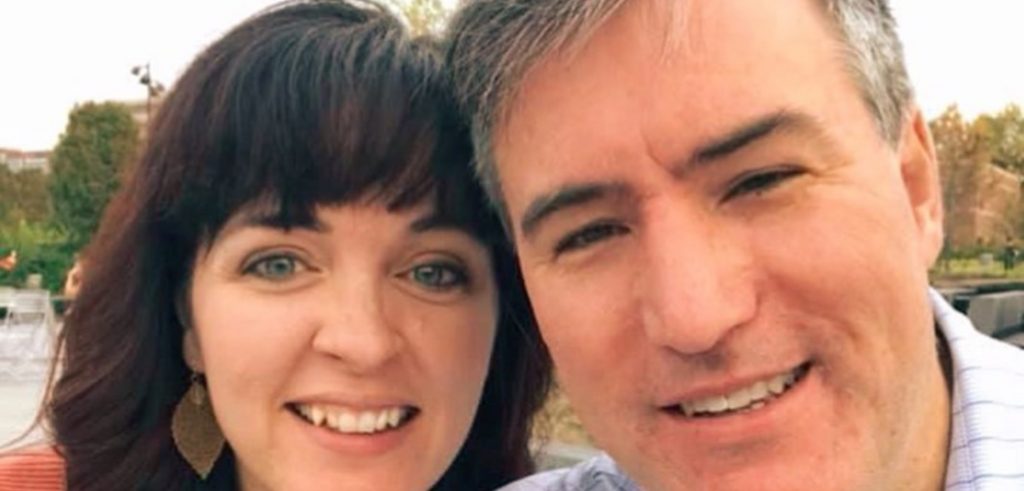
OSV/courtesy
Jason Shanks, his wife, Melissa, and their children lived a harrowing three months after the Huntington family was hit by COVID-19. Although the rest of the family recovered fairly quickly, the virus seemed intent on taking Jason’s life.
A ‘reset’ on life
At 44 years of life, Jason has experienced a “really profound intermission … a reset,” Melissa said. “Jason was dead. Machines were keeping him alive for weeks. The fact that he is now walking on his own, breathing on his own … it really has been a profound experience to watch. It’s almost like a rebirth.”
“Theologically, I almost refrain from wanting to use the word miraculous, only because obviously the Church would have to verify,” Jason said, but from “everything the medical people are telling me, it seems like there’s no other explanation for” the recovery.
He added: “There was a moment where all of a sudden I was showing recovery, and that moment happens to correspond to when Melissa and people around the world started doing the St. Jude Novena. When I asked the medical people what would explain going from some of the worst X-rays you’ve ever seen to marked improvement, they [told] me it only could be prayer.”
Jason’s kidney doctor refers to his patient as the “Miracle Man” whose kidneys are back to normal after having shut down. “He really doesn’t have an explanation for how that transpired,” Jason said.
Looking back at his illness and his ongoing recovery, Jason said he feels both grateful and humbled by the experience — and he’s left with a serious sense of responsibility, especially knowing how so many others fighting COVID-19 did not recover.
“It makes me wonder, what purpose does God have for me? Why did he spare me when others died?” Jason said. “I don’t want to let him down. I don’t want to let all these people that prayed for me down.”
His priorities, he said, have been refocused, too.
“When you almost lose your life, it just puts everything in perspective as to what’s important and what’s not important, and a lot of daily things that we can get caught up on just go away,” he said. What’s important, he’s been reminded, is his family.
“In many ways, I feel like the story of me in regard to all the last three months is more of a story about my wife and our marriage,” he said. “When you get married and take those vows and you stand in front of your family and friends in a church, you say these things … but it’s not until something like this happens that I think you get to really see the face of marriage lived out — the face of what love looks like.
“And for me it was the strength of my wife,” he said. “We did not have this planned. We did not have this in the cards. She did not know where life insurance was [or] where accounts were. She had to take care of everything at home, rally people in terms of prayer, make medical decisions for me, and be by my side. I believe that she saved my life, and frankly, I think it’s for the better. Hopefully it will change our marriage going forward.”
Melissa, too, learned a valuable lesson about the meaning of marriage and the power of community. “This taught me that … your marriage isn’t necessarily just about yourselves or your kids, but actually about the whole Church and your whole community,” she said. “At times in your marriage, you’re going to need support from a big group of people. We wouldn’t have made it through without them.”
One thing is clear: after this ordeal, life for Jason and Melissa will never be the same.
“There’s so much richness both spiritually and just in life experience that we’re really going to have to plow through,” Melissa said. “This was a horrible, horrible trial, but it has the potential to have a buried treasure chest at the bottom of it that we’re going to be going through for the rest of our lives.”
Jason returned to work on Monday, Feb. 22. He wears his St. Jude medal every day.
Gretchen R. Crowe is editorial director for periodicals at OSV.
The best news. Delivered to your inbox.
Subscribe to our mailing list today.






